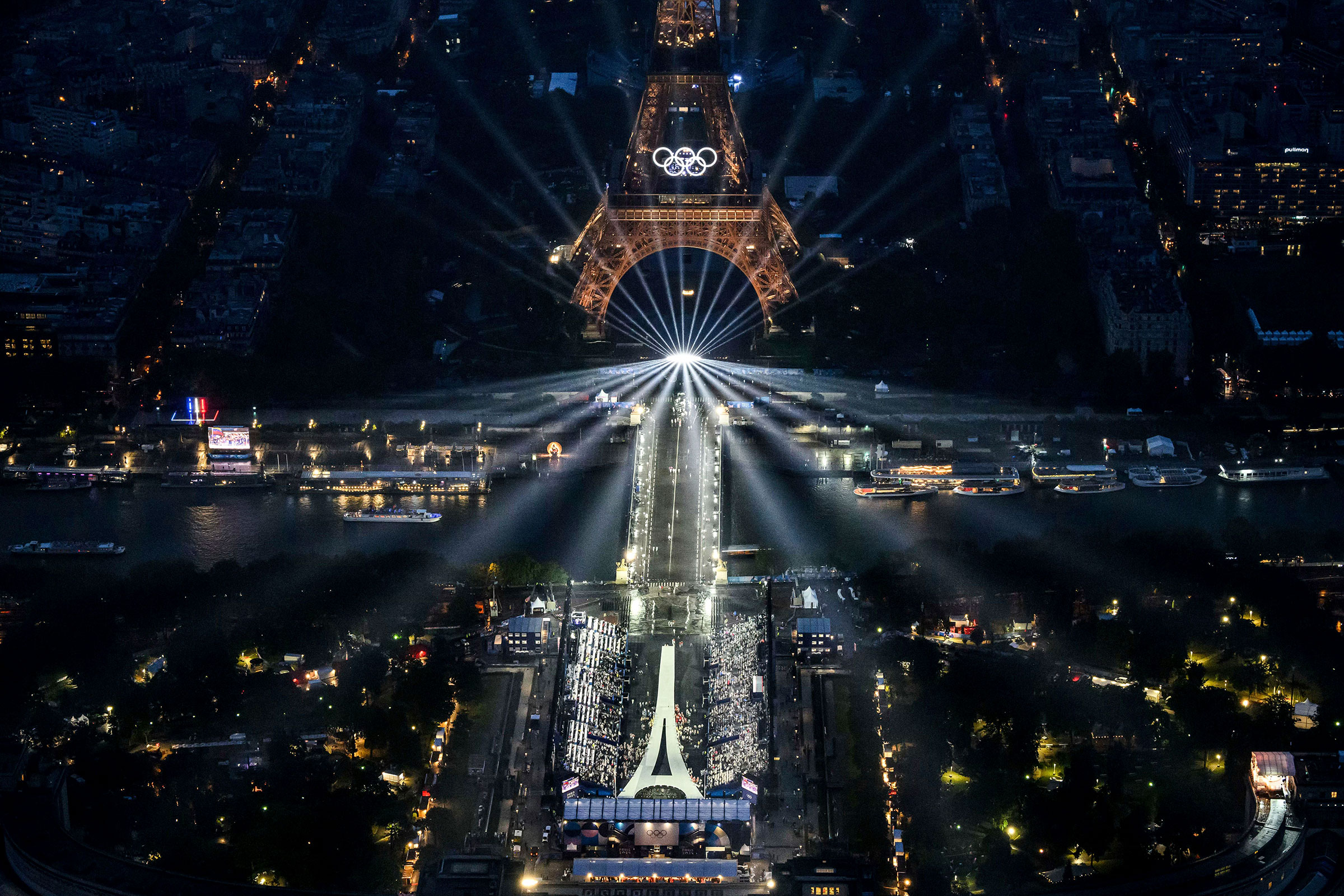One of the main attractions of the 2024 Paris Olympics is, of course, Paris. The City of Lights and its many world-famous landmarks will take center stage at this year’s Games. While equestrians will compete at Versailles, beach volleyball matches will play out in the shadow of the Eiffel Tower. Swimmers will, weather permitting, race in the Seine. But it’s hard to imagine that any one event will offer as magnificent a tribute to Paris as Friday’s Opening Ceremony, which eschewed the confines of a stadium and made the entire city its stage. The ceremony, which took place in the hours surrounding sunset in France and will re-air in “enhanced” form at 7:30 pm ET on NBC, was occasionally weird, wildly ambitious, ultimately wonderful, and extremely French.
[time-brightcove not-tgx=”true”]
The torch relay was a spectacle in itself, as French soccer superstar Zinedine Zidane carried the flame through the cafes and skate parks of Paris, before passing it off—in a Métro tunnel—to a masked figure who would shepherd it over rooftops, across a zipline, and beyond, en route to the Olympic cauldron at the Trocadéro. Meanwhile, the Parade of Nations proceeded along a 3.7-mile stretch of the Seine by boat, pausing for the musical performances and other themed vignettes that artistic director Thomas Jolly interspersed throughout the four-hour event, in order to give each country’s delegation a moment in the spotlight.
Each show-stopping moment—from Lady Gaga’s surprise-but-not-really appearance, during which she sang flawlessly in French, surrounded by dancers with feathery fans, to the unexpectedly moving sight of a pianist Alexandre Kantorow playing Ravel in the rain—was situated in an iconic Parisian setting. International pop sensation Aya Nakamura gave an energetic performance in a gorgeous, monochromatic, Olympics-appropriate gold ensemble, on the Pont des Arts, which connects the Institut de France with the Louvre. On the roof of the Grand-Palais, mezzo-soprano Axelle Saint-Cirel sang “La Marseillaise.” A footbridge was converted into a catwalk, near the Eiffel Tower, for a celebration of French fashion.
Read more: Paris 2024 Olympics Opening Ceremony in Photos
And in the ceremony’s final minutes, there was Celine Dion, long rumored to be performing in Paris, singing Édith Piaf’s “Hymne à l’amour” on a stage midway up the same tower, belting triumphantly for all the city and the world to hear. You didn’t have to be her biggest fan to feel your heart swell at the sight—and, more to the point, the sound—of the singer, who had been sidelined by stiff person syndrome, back in top form. With all there is to feel hopeless about in 2024, it’s hard to imagine a more elegant embodiment of resilience.
As is often the case for events freighted with tradition, the most enjoyable moments tended to be the strangest—and the most idiosyncratically French—ones. Dozens of dancers in hot pink doing the can-can? Fantastique. Marie Antoinette holding her freshly decapitated, singing head, as the introduction to a set piece that would pair opera singer Marina Viotti with French metal stalwarts Gojira? Vive la révolution. An ode to love and literature that began in the library and ended with what was, by all appearances, a ménage à trois entering an apartment and saucily closing the door on the camera operator? Ooh la la. It wouldn’t be Paris without that frisson.
Were there missteps? Mais oui; a show of this scale and length could never be perfect. The amount of time devoted to Minions, weeks after the release of Despicable Me 4, during a cinema segment that also featured such deserving pioneers of French film as Georges Méliès, struck me as obscenely promotional. (If you’re wondering about the French connection, the movie was produced by Illumination Studios Paris). The pre-Celine final hour was boring, if unavoidably so, with its welcome speeches and laser lights and ceremonial boat ride. NBC’s coverage for American audiences was also, while not weak enough to become a major distraction, something of a lowlight; announcers and correspondents offered plenty of canned sports factoids and bland Team USA interviews but little information about the performances.
But no false note could spoil the city-spanning spectacle that Jolly and his team pulled off, with rain adding another major obstacle to the event’s execution. Especially after two Opening Ceremonies, Beijing 2022 and Tokyo 2020 (which was postponed to 2021), that were relatively anticlimactic and impersonal due to COVID-19 restrictions, the Paris edition felt both grand and human. When it was cheesy (see: the obligatory rendition of “Imagine,” this time on a barge with a burning piano that all-too-clearly symbolized a world on fire), it was endearingly so. More than high-end entertainment for spectators who pay handsomely for seats at the stadiums or viewers in living rooms around the world, it resonated as a show about and for Paris, making the city’s buildings and monuments and history and, above all, people the center of the celebration.

